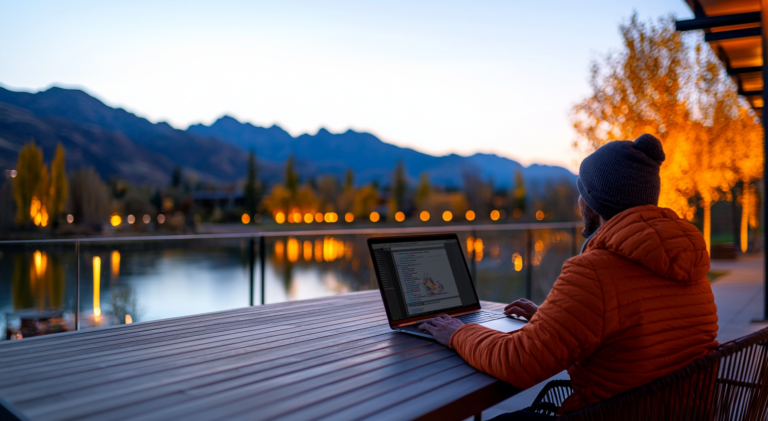Hey there, fellow adventure-seekers! Ever dreamed of ditching the cubicle and exploring the world, all while making money? Sounds like a fantasy, right? Well, it’s totally achievable, and I’m living proof! I’m Paul Peery, and I’ve spent years figuring out this whole “digital nomad” thing. It’s about blending work and travel in a way that feels amazing. This guide is your roadmap to becoming a digital nomad – earning a living online while seeing the world. We’ll cover everything from finding remote work to staying productive on the road. Let’s turn that dream into a reality! My main point? It’s easier than you think to make a good living online and travel, but it takes planning and a willingness to learn new things.

What Exactly is a Digital Nomad, Anyway?
So, what’s the deal with this “digital nomad” buzzword? It’s simple, really. A digital nomad is someone who uses technology to work remotely – meaning, they’re not tied to a specific office. They can work from anywhere with a decent internet connection: a coffee shop in Bali, a co-working space in Berlin, or a hammock in Costa Rica! The key is location independence.
It is important to differentiate Digital Nomads and Remote Workers. While all digital nomads are remote workers, not all remote workers are digital nomads. Remote workers may work from home or other locations other than an office, but are generally in one location. Digital Nomads, on the other hand, take remote work a step further and move from place to place, domestically and internationally.
The beauty of this lifestyle is the freedom. You’re not stuck in one place. You can chase good weather, explore different cultures, and meet amazing people. But it’s not just about sipping cocktails on the beach (although there’s some of that too!). It’s about designing a life where work fits around your adventures, not the other way around. This can be a big change from a traditional 9-to-5 job, and it takes some getting used to. But trust me, the flexibility is worth it!
Finding Your Remote Income Stream: Popular Online Jobs
Okay, this is where the rubber meets the road. How do you actually make money online? There are tons of options, and the best one for you depends on your skills and interests. Here are a few popular paths:
- Freelancing: This is a classic. Offer your services on platforms like Upwork, Fiverr, or Guru. Are you a writer? A graphic designer? A web developer? A social media whiz? There’s a demand for almost every skill online.
- Online Teaching/Coaching: If you’re knowledgeable about a particular subject, you can teach it online! This could be anything from English lessons to yoga classes to business coaching.
- Blogging/Vlogging: Share your passion with the world! Start a blog or YouTube channel and monetize it through ads, affiliate marketing, or selling your own products. (More on this later!)
- E-commerce: Sell physical or digital products online. You could create your own products or use dropshipping (where you don’t have to handle the inventory yourself).
- Virtual Assistant: Help busy entrepreneurs with tasks like scheduling, email management, social media, and customer service.
- Software Development/Coding: If you have coding skills, you’re in high demand! Many companies hire remote developers. This is great news. If you are willing to learn, and have time to learn, there is a path for you!
Building Your Online Brand: Why It Matters
No matter which income stream you choose, building a personal brand is super important. Think of it as your online reputation. It’s how people will find you and trust you. Here’s why it matters:
- Stand Out from the Crowd: There are a lot of digital nomads out there. A strong brand helps you differentiate yourself and attract the right clients or customers.
- Build Trust and Credibility: People are more likely to hire or buy from someone they trust. Sharing your expertise and personality online builds that trust.
- Create Opportunities: A strong brand can lead to unexpected opportunities, like speaking gigs, collaborations, or even book deals!
So, how do you build your brand? Start by defining your niche – what are you really good at, and who are you trying to reach? Then, create a website (like my site, peery.me!), be active on social media, and consistently share valuable content. Don’t be afraid to show your personality!
Mastering the Art of Remote Work: Productivity Tips
Working on the road sounds glamorous, but it also presents unique challenges. It’s easy to get distracted by new surroundings or feel overwhelmed by the lack of structure. Here’s how to stay productive:
- Create a Routine: Even if you’re not in an office, having a daily routine is crucial. Set work hours, schedule breaks, and stick to them as much as possible.
- Find Your Ideal Workspace: Some people thrive in bustling cafes, while others need a quiet co-working space. Experiment to find what works best for you.
- Minimize Distractions: Turn off social media notifications, let your friends and family know when you’re working, and find ways to focus your attention.
- Use Productivity Tools: There are tons of apps and tools to help you stay organized, manage your time, and collaborate with clients. Some popular options include Trello, Asana, Slack, and Google Workspace.
- Take Breaks: It’s easy to get caught up in work, but remember to take breaks! Go for a walk, explore your surroundings, or just relax and recharge.

The Legal and Financial Side of Things: Taxes, Visas, and More
This part might not be as exciting as planning your next adventure, but it’s essential. Being a digital nomad involves some legal and financial considerations:
- Taxes: You’ll still need to pay taxes, even if you’re working abroad. Research the tax laws in your home country and the countries you’ll be visiting. You might want to consult with a tax professional who specializes in international taxation.
- Visas: Depending on your nationality and the countries you plan to visit, you might need a visa. Some countries offer special visas for digital nomads. Always check the visa requirements before you travel.
- Banking and Finances: Get a bank account that’s friendly to international transactions and has low or no foreign transaction fees. Consider using a service like Wise (formerly TransferWise) for international money transfers.
- Insurance: Make sure you have adequate health insurance that covers you while traveling. You might also want to consider travel insurance that covers things like lost luggage or trip cancellations.
Key Takeaway: Don’t let the legal and financial stuff scare you away from the digital nomad lifestyle. Just do your research and get organized!
Staying Connected: Internet Access and Communication
Reliable internet access is the lifeblood of a digital nomad. Here’s how to stay connected:
- Local SIM Cards: Buying a local SIM card is often the cheapest way to get data in a new country.
- Portable Wi-Fi Hotspots: These devices create a personal Wi-Fi network using cellular data. They’re great for working in areas with spotty Wi-Fi.
- Co-working Spaces: Many co-working spaces offer high-speed internet and a comfortable work environment.
- Cafes and Libraries: These are classic options for finding free Wi-Fi, but the quality can vary.
- Communication Tools: Use apps like Slack, Zoom, and Google Meet to stay in touch with clients and collaborators.
The Importance of Community: Finding Your Tribe
Being a digital nomad can sometimes feel lonely. It’s important to build a community of like-minded people who understand your lifestyle. Here’s how:
- Join Online Communities: There are tons of Facebook groups, forums, and online communities for digital nomads.
- Attend Meetups and Events: Look for digital nomad meetups in the cities you visit.
- Stay in Co-living Spaces: These are shared living spaces designed for digital nomads and remote workers.
- Connect with Other Travelers: Don’t be afraid to strike up conversations with other people you meet on your travels. You never know who you might connect with!
Balancing Work and Travel: It’s Not Always a Vacation
One of the biggest misconceptions about being a digital nomad is that it’s a constant vacation. While there’s definitely time for fun and exploration, you still need to work! It’s all about finding a balance.
- Set Realistic Expectations: Don’t expect to be able to sightsee every day. You’ll need to dedicate time to work, just like you would in a traditional job.
- Plan Your Work Schedule Around Your Travel Plans: If you have a big trip planned, try to get your work done ahead of time.
- Learn to Say No: It’s okay to say no to social events or activities if you need to focus on work.
- Embrace Slow Travel: Instead of rushing from place to place, consider spending longer periods in each location. This gives you more time to work and explore without feeling constantly rushed.

Dealing with Challenges: Homesickness, Burnout, and More
The digital nomad life isn’t always sunshine and rainbows. There will be challenges along the way. Here are a few common ones and how to deal with them:
- Homesickness: It’s normal to miss your family and friends. Schedule regular video calls, plan visits home, and build a strong support network online.
- Burnout: Working remotely can sometimes lead to burnout. Set boundaries between work and personal life, take regular breaks, and prioritize self-care.
- Unreliable Internet: This can be frustrating, but it’s part of the deal. Have backup plans, like a portable Wi-Fi hotspot or a list of cafes with reliable internet.
- Cultural Differences: Be respectful of local customs and traditions. Learn a few basic phrases in the local language.
- Loneliness: Proactively seek out other workers and communities. Loneliness can destroy productivity.
Planning Your First Digital Nomad Adventure: A Step-by-Step Guide
- Self assesment. Assess skills and interests to find your niche.
- Explore Income Streams. Research all online job opportunities.
- Budget. Craft a realistic budget, with emergency funds.
- Legal. Sort taxes, visas, banking, and health needs.
- Gear. Invest in essential tech and work tools.
- Connections. Build your online and personal network.
- Plan. Carefully devise and book your initial trip.
Conclusion
Becoming a digital nomad is an incredible journey. It’s a chance to see the world, challenge yourself, and design a life that truly excites you. It won’t always be easy, but it will definitely be worth it. Remember, it’s a marathon, not a sprint. Start small, learn as you go, and enjoy the ride! I hope this guide has given you the tools and inspiration you need to start your own digital nomad adventure. Now go out there and make it happen!
FAQ
How much money do I need to start being a digital nomad?
It depends on your lifestyle and where you plan to travel. You should have enough savings to cover your expenses for at least a few months, plus some extra for emergencies. A good starting point is to have at least $3,000 – $5,000 saved up, but you can start with less if you’re frugal.
Do I need a college degree to be a digital nomad?
Nope! Many digital nomad jobs don’t require a degree. Your skills, experience, and portfolio are more important. However, a degree can be helpful for certain fields, like online teaching.
What’s the best country for digital nomads?
There’s no single “best” country. It depends on your preferences and priorities. Some popular options include Portugal, Thailand, Indonesia (Bali), Colombia, and Mexico. Consider factors like cost of living, internet speed, visa requirements, and safety.


